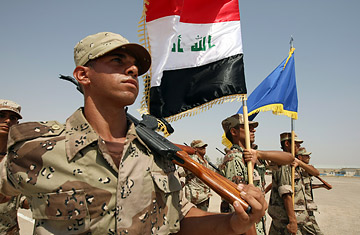
Iraqi Air Force warrant officers parade during a graduation ceremony at the Iraqi Air Force Training School in Taji, on the outskirts of Baghdad.
The disconnect on security between the U.S. and the government of Iraq crystallized Friday, as Washington made clear it is in no rush to pull troops out of Iraq, just as Baghdad made it clear it's shopping for 36 F-16 jet fighters that could end up costing the war-weary nation close to $4 billion. While it's easy to understand why the U.S. is leery of jeopardizing recent security gains with a hasty troop withdrawal — despite Prime Minister Nouri al-Maliki insisting on a timetable for ending the American military presence — the logic of Baghdad's effort to acquire a fleet of sophisticated warplanes is less clear.
Still, U.S. officials inside and out of the Pentagon were quick to say Iraq needs such high-powered weapons, and that the U.S. defense industry would be more than glad to supply them. "We sometimes roll our eyes when foreign defense ministers come here and want to buy fighters and things like that," a senior Pentagon official said, speaking privately. "But we don't feel that way about Iraq — given their history and neighborhood, they need to have a capable air force." Iraq has not committed to buying the warplanes and, if it does, it will be several years before they would be operational. But the move to acquire them certainly signals an intent to give Iraq the ability to defend itself without any direct U.S. presence.
Iraq hasn't been able to procure arms since it invaded Kuwait in 1990, and the U.S. invasion in 2003 pretty much crushed whatever military hardware Saddam Hussein had left. So Iraq is starting from scratch in rebuilding its military. "The Iraqi military is growing in strength and capability very rapidly now," Pentagon spokesman Geoff Morrell says. "They are turning into a very formidable force that not only will be able to deal with internal threats, but also handle external threats in a very dangerous part of the world." While the deal would require reviews from the Pentagon, State Department and Congress, it would likely win approval because it could reduce the demand for U.S. warplanes and personnel in Iraq, as well as generating U.S. defense-industry employment.
The U.S. push to help re-arm Iraq — helicopter gunships are already in the pipeline, and Baghdad is looking to buy 400 armored personnel carriers and six C-130 cargo planes — suggests an Iraqi government eager to fight its own battles without U.S. help. "Given Iraq's history and its location, it's going to create regular forces that are capable of not simply dealing with an insurgency but defending the country," says Anthony Cordesman, a military scholar with the Center for Strategic and Independent Studies. "And when a country is looking for prestige — a symbol of coming back as a fully operating nation — you're going to have to have modern weapons, and among the choices Iraq has, the F-16 is a very good buy."
At the same time, however, the Pentagon is in no rush to hand over responsibility for defending the country to Iraqis. Many on Capitol Hill and in the Pentagon had expected sharp cuts in U.S. troop levels there to begin this fall, but instead, the Pentagon is urging a more gentle paring of its 146,000 troop complement in Iraq. Following the Defense Department's recommendation, President Bush is expected on Tuesday to announce an 8,000-troop cut due to occur by the time his successor is inaugurated on January 20.
General David Petraeus, the top U.S. commander in Iraq, wanted to maintain the current force level through next June, but agreed to the modest troop reduction under pressure from Defense Secretary Robert Gates and Admiral Mike Mullen, chairman of the Joint Chiefs of Staff. They are eager to divert additional troops to Afghanistan, which can only happen if troops are pulled out of Iraq. Petraeus will soon inherit responsibility for overseeing both Afghanistan and Iraq when he becomes head of U.S. Central Command.
U.S. officials say the go-slow drawdown is driven by the fragility of the security gains in Iraq, where attacks by insurgents have fallen 80% since last year. But a lack of political progress in the country could trigger more violence, especially if large U.S. units pull out, Pentagon officials say. When the British pulled out of the southern city of Basra in 2007, the resulting vacuum was filled by Shi'ite militia units until the Iraqi government sent in its improving army in March and brought it under Baghdad's control. Petraeus also doesn't want to risk a security meltdown brought on by a major withdrawal just as a new U.S. President takes office.
Pentagon officials say there's no conflict between the slow withdrawal of U.S. troops and Baghdad's desire to buy warplanes. "The troop numbers are designed to stabilize Iraq in the short term," one said. "The F-16s — if they get them — are for the long term."
